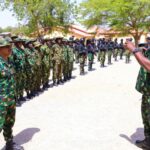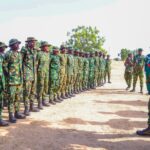By Chidi Omeje
And the cocktail of serious security infractions across the country continues. Just as the beleaguered nation was smarting from the numbing details of what would have snowballed into major inter-ethnic conflagration in Sasha, Ibadan, the Oyo State capital, news filtered in early on Wednesday that gunmen had yet again abducted school children, this time in Kagara, Niger State. Details later emerged that an indeterminate number of gunmen attacked Government Science College Kagara in Rafi Local Government Area, killing one student and abducting yet to be determined number of students and staff of the school. Yesterday it was Kankara; today it is Kagara…
The sad (but no longer shocking) story on Ash Wednesday morning has only but affirms the country’s infamy as one of the countries in the world where the safety of school children is not guaranteed. Other countries in that ignominious list include Afghanistan, Yemen and Somalia. But even among those countries, it is perhaps only Nigeria that holds the record of incessant mass abduction of students from their hostels by various hues of gunmen.
Debuted in Nigeria by Boko Haram terrorists with the abduction of 276 girls from Chibok School in April 2014, the novel but obviously lucrative crime of mass abduction of school children has since become a recurring criminal enterprise in the country. It does appear that the global outrage that trailed the Chibok episode may have given the villains and prospective villains, in both terrorist and bandit garb, the idea that indeed mass abduction of school children from their hostels hits differently at the heart of global human family.
So far, the horrible crime of school children abduction has become a recurring event that has proven to have defied government’s response. Yes response. Response it has always been because not much is known about any proactive or preventive measure by the government or its law enforcement agencies to halt that recurring horror that have blighted Nigeria’s image and standing in the comity of responsible, safe and progressive countries.
But mass abduction of school children is not the only thing ailing Nigeria’s security ecosystem. The problem is not even the fact the country is currently assailed in all fronts by the multiplicity of internal security challenges ranging from terrorism, banditry, kidnapping, violent herders-farmers clashes, inter-ethnic strife, cattle rustling, cultism, militancy, cyber-crimes, separatist agitation, armed robbery, ritual killings, and so on.
The major problem which bothers on our ability or otherwise to surmount the security challenges is at the heart of this crisis and the ineffective internal security operations mechanism is the major culprit. That all manner of internal security challenges that task our national security are popping up in various degrees, intensities and complexities across the country should not come to anyone as surprise. It is actually expected; and in fact, no nation in the world today is immune to the reality of its own internal contradictions or emerging security challenges. What makes or marks the difference, however, is how the security system in place is fashioned or implemented to confront any security situation. This to a large extent determines the level to which such security violation can easily be detected, confronted and surmounted or how fast and far reaching such challenge can fester, deteriorate or conflagrate.
Nigeria’s model of internal security operation is such that the Nigerian Police Force is the lead agency in dealing with any security challenge. In other words, the Nigeria Police is the first responders to any internal security violations; and not just responding first but taking charge and ensuring that the security challenge is nipped in the bud through intelligence undertakings. To boost this policing effort, the system created the secret police otherwise known as the State Security Services which will work in aid of the police to uncover and deal with crimes and criminalities that could imperil the state.
However, when the security challenge is such that is beyond the capacity of the police to contain, the civil authority, in exercise of its constitutional duties of providing security of lives and property to the citizens, is compelled to invite the military to act in aid of the police to deal with the situation. By this design and process, the Nigerian military is the last line of defence in our internal security operations mechanism. What this means in actual sense is that the military will only be called in when the security challenge is such that is beyond the capacity of the police to deal with.
Such security challenges like insurgency or terrorism which threatens the sovereignty of the state or which its perpetrators deploy combat grade weapons that have the capacity to overwhelm the police, are the kind of challenges that naturally demands military intervention. But that is not what is obtained now.
The police have become so dysfunctional, ineffective and watered down that its core responsibility as the lead agency in dealing with internal security challenges has been abdicated to the military. Almost every crime in the books in Nigeria today is handled by the military. The military are deployed to man elections; they are deployed to chase armed robbers, to stop cultists, to confront kidnappers; they are deployed to quell protests and even to chase street hawkers around! They are currently deployed to 34 out of the 36 states of the federation to do the work they were not in actual sense trained to do.
The military is trained to kill and dominate territorial areas and not to chase around criminals and deviants. Our military is over stretched not with fighting wars with external aggressors or internal insurgents but by the wanton deployment of its troops to do the work which the civil police has failed to do. The indisputable fact is that this unrestrained deployment of our troops to deal with every security violation in the land is rubbing off negatively on their professionalism and opening them up to civilian idiosyncrasies and foibles.
Even more dangerous is the reality that owing to this over-use, our Armed Forces have hardly had time to conduct basic joint trainings that would have strengthened the synergy between and among the thri-service institution. In fact, the last time the Nigerian Armed Forces conducted Joint Operations Exercises (JOPEX) was in 2010 when they organized the Operation Ologun Meta around the Okitipupa axis in Ondo state and adjoining areas.
How then are we expecting to see a very efficient military that will win wars for us when we deny them of such important trainings and exercises by always overstretching them with ceaseless internal security operations? How come that in today’s Nigeria, whenever there is any report of security challenge, our instinctive gaze is at the military? Is the military trained to take care of our everyday security infractions? What about the civil police? What about the intelligence community?
The follow-up questions to ask are, what are we doing with our civil police? How much are they contributing in dealing with the multiple internal security challenges assailing our country today? What is stopping the office of the National Security Adviser from taking charge and spearheading a through reorganization of our internal security mechanism in order to restore order in the functions and expectations of each of the security, intelligence and response agencies? Why can’t we try out the state police option to see if it will be more effective dealing with the hydra-headed contemporary security challenges? Why must our police be rendered impotent and grossly ineffective?
Why must about 50% of Nigerian Police personnel be deployed to secure individuals and private concerns leaving our spaces ungoverned and under-policed? Why are our Mobile Police personnel deployed to carry handbags for politicians, their wives and concubines and even celebrities while our communities, streets and farm lands are left to the vagaries of crimes and criminalities? And by the way, what did we eventually do with the SARS officers that were recently disbanded? Were they simply disarmed and deployed into various police stations or where are they exactly?
What about the Civil Defence Corps? What exactly are they contributing in all of these multiple internal security challenges confronting us? Has anybody ever seen personnel of Civil Defence at work after 5 pm in the evening? Of what use are they really?
More questions: why can’t we make better use of these security elements by deploying them to areas where the military are conducting operations so that they can at least provide security in liberated communities while the troops advance further? Why can’t we retrain and equip them so that they can become intelligence assets, knowing that intelligence holds the key to most of these security challenges? Why can’t we think outside the box and be bold enough to tinker with and we fix the obviously weak and ineffective internal security operations mechanism that has not provided needed desired results?
Chidi Omeje is the Editor-in-Chief, Nigeria Security Digest
(www.securitydigestng.com)







